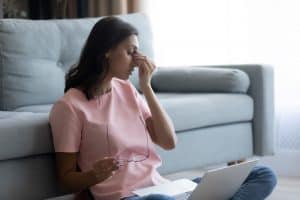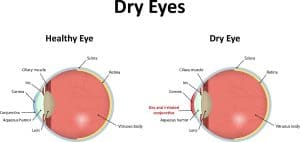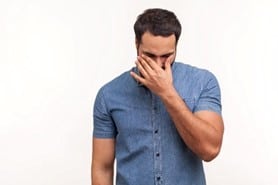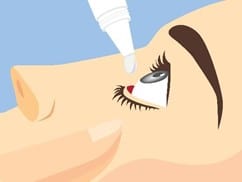Dry Eye Treatment in Dubai
 Dry eye is a common ailment that occurs when a person does not produce enough high-quality tears to wet the eyes. It is characterized by chronic itching, burning, redness and/or irritation of the eyes. At the Atlanta Vision Eye Clinic in Dubai, our team of skilled eye doctors regularly help patients looking for relief from dry eye. Because dry eye does not go away on its own and not all solutions work for each patient, we commit ourselves to finding the long-term solution that is successful for each patient.
Dry eye is a common ailment that occurs when a person does not produce enough high-quality tears to wet the eyes. It is characterized by chronic itching, burning, redness and/or irritation of the eyes. At the Atlanta Vision Eye Clinic in Dubai, our team of skilled eye doctors regularly help patients looking for relief from dry eye. Because dry eye does not go away on its own and not all solutions work for each patient, we commit ourselves to finding the long-term solution that is successful for each patient.
Dry Eye Causes
While dry eye affects a wide range of people of all ages and ethnicities, people at an increased risk for dry eye include those who:
- Are over the age of 50
- Wear contact lenses
- Live in an arid climate like Dubai
- Spend time in temperature-controlled rooms (air conditioned or heated)
- Work at a computer throughout the day
- Have recently had LASIK surgery
- Take certain medications for high blood pressure, acne, depression, congestion, Parkinson’s disease or hormone replacement therapy
- Have lupus, rheumatoid arthritis or a thyroid disorder
- Do not have enough vitamin A in their bodies
Common Symptoms of Dry Eye Disease
Dry eye disease affects people differently, with varying levels of severity. Some people’s symptoms are only mildly annoying, whereas others find the symptoms practically life-altering. The most common symptoms of dry eye disease include the following:
- Stinging, burning or itchy eyes
- A “foreign body sensation,” which feels like a piece of dirt or debris is stuck in the eyes
- Red eyes
- Excessive tearing
- Eye fatigue or eye strain
- Discharge
- Sensitivity to light
- Difficulty wearing contact lenses
If dry eye disease is not detected or left untreated, it can progress to cause serious damage to the ocular surface. In the worst cases, dry eye disease can also lead to loss of vision.
Types of Dry Eye
There are two distinct types of dry eye disease. In aqueous dry eye, the eyes do not produce sufficient tears to keep the eyes properly lubricated. In evaporative dry eye, the eyes produce tears but the tear components are not balanced, causing the tears to evaporate quickly off the surface of the eyes.
Dry Eye Disease Risk Factors
Certain factors raise the risk of developing dry eye disease; for instance, living in a dry, arid climate like Dubai. Women and contact lens wearers are more likely to develop dry eye disease; the same is true for individuals with autoimmune diseases, diabetes or certain dermatological conditions (particularly rosacea).
If you are experiencing any symptoms that may indicate dry eye disease, you should schedule an appointment with our team as soon as possible. During the appointment, we will take down a complete patient history, ask you about the nature and frequency of your symptoms and perform a comprehensive eye exam to look for signs of dry eye disease.
How to Prevent Dry Eye
In most cases, people can take simple steps to both prevent and alleviate their dry eye symptoms. Using a humidifier in the home can stop the eyes from drying out. Because staring at a computer, phone or television screen can also cause dry eye to flare up, looking away from the screen at something else such as a blank wall for at least 20 seconds approximately every 20 minutes can also be useful. Other patients have found success carrying around artificial tears (aka eye drops) to lubricate the eyes and quickly relieve the itchiness. Many brands of artificial tears are available as an over-the-counter product and are therefore easily accessible.
Dry Eye Treatments for Lasting Relief
 When eye drops alone and home remedies are insufficient at battling dry eye, the Atlanta Vision Center offers other, more involved solutions:
When eye drops alone and home remedies are insufficient at battling dry eye, the Atlanta Vision Center offers other, more involved solutions:
IPL Treatment
IPL (intense pulsed light) involves shining an infrared light over the eyes to warm the oily glands on the edges of the eyelids known as the meibomian glands. The heat from the light works to disrupt blockages in the glands and improve the production of healthy, natural tears. One study found that IPL improved dry eye in about 87% of treated patients.
Patients will need an average of four IPL treatments to reap the full benefits. Fortunately, each procedure is quick, lasting about 10 minutes. The results from IPL should improve dry eye for at least a year before further treatments become necessary.
Prescription Medication
Two prescription drugs have been approved by the FDA for treatment of dry eye: Restasis and Lifitegrast (aka Xiidra). Both of these medications come in eye drop form. They simultaneously reduce inflammation and boost natural tear production, though patients will often need to take the drops for at least three months before noticing the effects. About 25% of dry eye patients who try these drugs find relief from taking them on a regular basis.
Dry Eye FAQs
What Happens If I Do Not Treat My Dry Eye?
 The consequences of ignoring dry eye can become more serious than eye irritation. As dry eye becomes more severe, the condition can inflame your eye, cause abrasions on your cornea and even lead to corneal ulcers. Your overall quality of vision can also decline, making it difficult to read or tackle other sight-related tasks. Moreover, eyes that are not sufficiently moist have a heightened risk of becoming infected.
The consequences of ignoring dry eye can become more serious than eye irritation. As dry eye becomes more severe, the condition can inflame your eye, cause abrasions on your cornea and even lead to corneal ulcers. Your overall quality of vision can also decline, making it difficult to read or tackle other sight-related tasks. Moreover, eyes that are not sufficiently moist have a heightened risk of becoming infected.
If My Eyes Produce Enough Tears, Why Am I Still Experiencing Dry Eye?
It is certainly possible to develop chronic dry eye even when your eyes make tears. Eye mucous is necessary to keep the tears on the eye’s surface, and oil is necessary to prevent the tears from evaporating. Accordingly, having insufficient tear, mucous or oil production can all contribute to dry eye, which is why it is important to consult a doctor who can devise the right treatment plan for your eyes.
How Often Should I Use Artificial Tears?
Artificial tears should be applied frequently to keep your eyes hydrated, not just when your eyes feel especially dry. Regular lubrication helps to prevent the eyes from becoming dry and scratchy in the first place.
Why Are Women More Susceptible to Dry Eye?
Women are about twice as likely to experience dry eye as men. The main reason for this discrepancy between the sexes seems to be the hormonal changes that women go through at various stages in their life. Puberty, pregnancy, menopause and use of birth control pills can all affect a woman’s hormone levels, which also impacts the eyes. However, just because dry eye is more common in women does not mean they should not seek treatment to relieve irritation and prevent further damage.
Do I Still Need to Use Eye Drops after Having IPL?
Most patients who have finished their course of IPL treatment no longer require artificial tears to avoid dry eye. If down the road your eyes start to become dry again, that is a sign that you should visit your doctor to discuss additional IPL treatments.
What Is the Cost of Treating Dry Eye?
 The price of dry eye treatment depends on the course of treatment recommended. During a consultation with the expert doctors at Atlanta Vision Eye Clinic, our team can advise you on the related costs. Insurance does not often cover the cost of treating dry eye, but it is worth checking your individual plan to determine what you are entitled to.
The price of dry eye treatment depends on the course of treatment recommended. During a consultation with the expert doctors at Atlanta Vision Eye Clinic, our team can advise you on the related costs. Insurance does not often cover the cost of treating dry eye, but it is worth checking your individual plan to determine what you are entitled to.
Can I Wear Contact Lenses If I Have Dry Eye?
Although contact lens use can worsen symptoms for some dry eye patients, treatment for dry eye should enable you to keep wearing your contacts. Some contact lens brands are made specifically for patients with dry eye; our doctors can help advise you on these options.
Why Is Dry Eye So Common after LASIK?
When a flap is created in the cornea to correct refractive errors, this damages some corneal nerves and can interrupt tear production. Almost all LASIK patients experience dry eye after their surgery, but the good news is that LASIK is rarely responsible for chronic dry eye. Most patients notice their dry eye subside within a week or two. Patients who continue to experience itchy eyes for over a month may want to consult with a doctor or start lubricating with eye drops until the problem clears up.
Schedule an Appointment
Dry eye is not a condition that you must learn to tolerate for the rest of your life. If you have not found success managing chronic dry eye on your own, please call the Atlanta Vision Eye Clinic in Dubai at 971-4-348-6233 to set up an appointment with one of our knowledgeable ophthalmologists.
